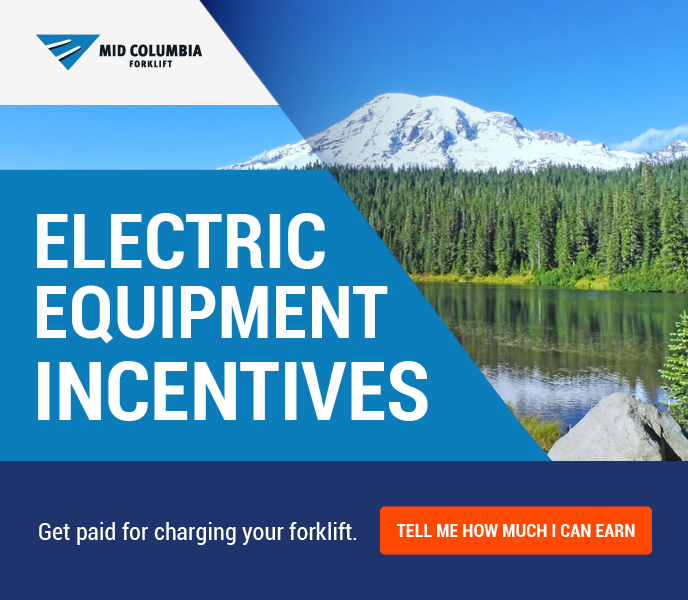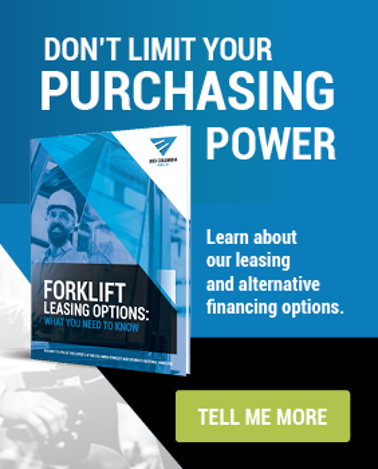Converting From IC to an Electric Forklift Fleet? Here’s What to Expect
by Trey Barber, on October 4, 2024 at 6:21 AM
 The electric revolution is in full swing in Washington State. If you're thinking about how your company can take advantage of those enticing incentives, electric forklifts might be for you. However, before you make the switch, there are a few things to know so you don't set yourself up for a disaster. Read on to learn the benefits of an electric fleet and what to consider before converting.
The electric revolution is in full swing in Washington State. If you're thinking about how your company can take advantage of those enticing incentives, electric forklifts might be for you. However, before you make the switch, there are a few things to know so you don't set yourself up for a disaster. Read on to learn the benefits of an electric fleet and what to consider before converting.
Why Convert to Electric Forklifts
Electric fork trucks offer many benefits over their IC counterparts. Here are three you should consider when thinking about the switch.
- Zero Emissions. IC engines burn fossil fuels to create the energy needed for the forklift. This creates exhaust. Gases in the exhaust, like carbon monoxide, degrade the environment and the air quality of your facility. High-quality HVAC systems can manage this risk, but even a low concentration of carbon monoxide in your air can be dangerous. Electric forklifts don’t produce emissions, ensuring your facility’s air stays clean and safe.
- Low Maintenance. Engines feature a host of moving parts, each increasing the potential of a breakdown. However, forklift motors are much simpler pieces of equipment that are less prone to failure. Consequently, IC forklifts require more maintenance than engine-less electric forklifts.
- State Incentives. Many states, including Washington State, offer state-wide incentives for organizations to convert their IC fleet to electric fork trucks. These incentives considerably offset the investment cost, making conversion the best financial decision for many companies.
Common Electric Fork Truck Myths
 Despite these benefits, many myths persist about electric forklifts. Some were true in the early days of the technology, but now electric fork trucks can do pretty much anything an IC forklift can.
Despite these benefits, many myths persist about electric forklifts. Some were true in the early days of the technology, but now electric fork trucks can do pretty much anything an IC forklift can.
- Lifting Power. Early electric forklift models weren’t as powerful as IC forklifts. However, that has long since changed. Heavy-duty models can lift as much as comparable diesel models. In fact, Seattle’s SSA Marine, the Port of San Diego, and the Port of Stockton have all begun converting their fleets to electric.
- Expense. This myth finds its roots in sticker shock. Electric fork trucks require a greater initial investment than IC. However, the savings provided by low maintenance costs, reduced downtime, state incentives, and minimized fuel costs mean the total cost of ownership of an electric forklift is often much lower for electric.
- Indoors or Outdoors. Electric forklifts do, in fact, work in the rain. Just like IC forklifts, there are indoor and outdoor electric forklift types. Outdoor electric fork trucks have shielding against the elements, including dust and water. This shielding makes them a superior choice for high-dust work like hay production.
What To Plan for When Converting to Electric Forklifts
 Unfortunately, converting from an IC fleet to an electric one is not as simple as adding an electric fork truck to your shopping cart and clicking the checkout button. It requires careful planning and consideration to ensure the switch is both right for you and made at the best time for your organization. There are many details to consider, but most fall into three broad categories.
Unfortunately, converting from an IC fleet to an electric one is not as simple as adding an electric fork truck to your shopping cart and clicking the checkout button. It requires careful planning and consideration to ensure the switch is both right for you and made at the best time for your organization. There are many details to consider, but most fall into three broad categories.
Financial Considerations
Whether you own or lease your forklift fleet makes a massive difference in how and when you convert. If you own your fleet outright, carefully analyze your situation to ensure your usage or state incentives justify the conversion. Otherwise, you might be pouring money down the drain.
If you lease your forklift fleet, start by determining when the lease expires on each forklift. If they all expire at the same time, you can work with us to develop a transition plan. A global shift plan like this provides the smoothest transition from IC to electric.
Things become more complicated if your leases expire at different times. A gradual shift might seem like the best idea on the surface, but it requires training on, maintaining, and powering both IC and electric fleets for the duration of the transition. Doubling up the work like that strains your facility and provides little additional benefit.
Power Requirements
IC fueling is relatively fast and requires little storage. However, this may not be true for electric forklifts, depending on your chosen battery. Forklift batteries come in two broad varieties: lead-acid and lithium-ion. Lead acid has longer charging requirements, but they are less expensive. Lithium-ion offers rapid and opportunity charging but is more expensive.
Choosing lead acid means you'll need space to store charging batteries with multiple batteries for each multi-shift forklift. Lithium-ion, on the other hand, only needs one battery per forklift and uses low-profile charging stations but requires space for the forklift to park while charging.
OSHA Required Training
OSHA requires that operators receive training on every unique type of forklift they use. Electric models are sufficiently different from IC forklifts that additional training is required. You'll need a plan to ensure your whole team receives training on your new electric fleet before it goes into active service.
A Quality Conversion Partner Matters
The devil is in the details, and never more so when planning a large-scale shift like going electric. Trying to brave it on your own leaves you open to a multitude of hidden pitfalls sure to have you questioning why you ever decided to make the change in the first place. That's why you need a quality conversion partner like Mid Columbia Forklift.
Our experts have done this all before. They know where all the hazards are and have the experience to guide your team through the conversion process. We can even help you take advantage of state incentives, boosting your ROI. Don't bushwhack your way through when we can show you the trail. To learn more about converting to electric or how we make conversion seamless, contact us online or visit your local Mid Columbia Forklift.
Auburn 253-854-5438
Pasco 509-547-7413
Wenatchee 509-663-9009
Yakima 509-457-5137
Further Reading
5 Reasons Why Li-ion Forklift Batteries Are Better than Lead-Acid
5 Surprising Electric Forklift Applications in Washington State
Lithium-Ion Forklifts for Ports and Other Heavy-Duty Applications




